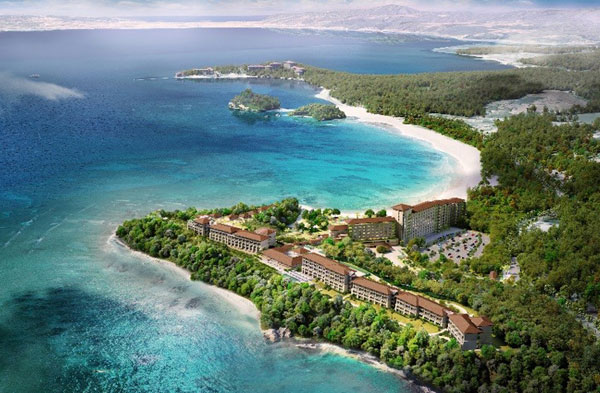✕

Column: industry Tag: Halekulani hotel,Halekulani Corporation,Japan Published: 2017-11-30 10:00 Source: Author:

Mitsui Fudosan and Halekulani Corporation will expand the Halekulani hotel brand with a second property set to open in Okinawa, Japan, in the summer of 2019. (Rendering: Halekulani Corporation)
HONOLULU—The Halekulani hotel in Honolulu just celebrated its centennial this year, and now plans are in motion for the brand to open a second property, nearly 5,000 miles away in Okinawa, Japan.
It took the Halekulani Corporation and its parent company, Japan-based Mitsui Fudosan, nearly 10 years to identify the right location for its second property, said COO Peter Shaindlin.

Peter Shaindlin,
Halekulani Corporation
Several locations were proposed by different companies over the years, Shaindlin said, and he and his team “said no a thousand times.”
Shaindlin said the process wasn’t easy, and at times was frustrating. But it was more important to do it right than to do it quickly—even if that meant taking 20 years to scout locations, he said.
“We realized that (since) so many people adore the current property, to do a second one … is the hardest because everyone will look at and it say, ‘so that’s what you think Halekulani stands for ….’ Now it has a context to be judged against,” he said.
Finally, a location clicked with the Halekulani team—in the beach-resort community of Onna Village in Okinawa.
“This one (in Okinawa) felt right for us,” he said. “We saw this spectacular green field peninsula and thought that it looks like a Halekulani to us.”
Japan was the right choice because of many intersecting factors, Shaindlin said. Mitsui Fudosan is based in Tokyo, and Japanese travelers to Hawaii have long had a special affinity for the Halekulani. Furthermore, Shaindlin pointed out that in the Japanese language, the word “halekulani” can often be used as a noun to describe a transformational experience.
Mitsui Fudosan will own the new 360-room Okinawa property just as it owns Halekulani Hawaii, while Halekulani Corporation will spearhead brand oversight, he said.
Recreating the brand in Japan
The magic question, Shaindlin said, was how to translate the emotional and service experience of the Halekulani Hawaii?into a new country, new setting and new building.
The most challenging part—and the one requiring the most creative and innovative thinking—will be executing true brand expression, Shaindlin said.
“One of the things we will be doing is we’ll deploy, and I’ll lead, sort of a service SWAT team that will come in a year before the opening and work with the general manager there and (get the) team to participate in the brand training,” he said.
He said he wants the service training to be so precise that guests checking into the Halekulani Okinawa could say, “Peter, this feels like a Halekulani.”
As for the brand’s service approach, Shaindlin said it isn’t scripted like some of the big-box luxury chains might be. For example, at the Halekulani Hawaii, local colloquialisms such as “Aloha” and “Mahalo” aren’t required like they are at other hotels.
“If they’re Hawaiian and they want to say that, that’s wonderful, but otherwise it’s more about personalized service versus institutionalized service,” he added.
The design of the Okinawa property will have elements of Japan while still incorporating the original Halekulani feel, Shaindlin said. The Halekulani Hawaii is a big supporter of arts and culture, with a strong emphasis on Hawaiian art. The Okinawa hotel will reflect that overall idea as well, but with local Okinawan art.
Blending respect for local culture and hospitality standards will continue to be a hallmark of the Halekulani experience, he said.
The major restaurant concepts at the current Halekulani include La Mer, Orchids and House Without a Key, he said, and each have their own legacies. The Okinawa property will not directly replicate those concepts.
“We don’t want to be cookie-cutter like some companies (are): All of a sudden it’s the same name and in each hotel they have the same,” he said.
Instead, guests can expect a high-end restaurant—like La Mer—possibly with French or Italian cuisine, an all-day dining option with a different style but similar informal spirit to House Without a Key, and a third dining option, which might be Japanese food, he said.
Okinawa market, hiring
Currently Okinawa has an unemployment challenge, which could make finding workers difficult as various other hotels opening over the next few years compete for labor.
Shaindlin said he prefers to have as much local staff as possible working at the hotel. The community is the company’s first point of sourcing because it believes local people are the best ambassadors of their culture and place, he said.
“Also, we believe in giving back to the community, business-wise; and one of the ways to do that is creating employment, benefits and improving quality of life for locals and their families,” he said.
The Halekulani Hawaii already has some employees with Okinawan roots, and they might be selectively chosen to transfer to Okinawa, Shaindlin said, but it’s too early to decide that now.
He said Okinawa’s reputation as a safe travel destination is a key demand driver, and expansion of the nearby Naha Airport also will help business.
Halekulani’s target guests
In identifying its target guests, Halekulani employs psychographics, not demographics, Shaindlin said.
Hotels are about multigenerational common experiences, he said. “The values that they represent are not about ages or trends; they’re about life legacies and transformational experiences,” he said.
He believes that both the millennial and the nonagenarian want those moving experiences, and for Halekulani, it doesn’t make sense to unnecessarily segregate markets. Instead they create a common psychographic, he said.
The hotel industry can be notoriously myopic in how hotels imitate each other “after somebody already took the test,” he said. The saying at Halekulani is, “don’t get caught in the race with the same place,” he said.
“We’re a little bit offbeat; we’re not for everybody,” he said. “For those who want something personalized rather than cookie-cutter institutionalized, that’s what we’ll do in Okinawa, like we do it in Hawaii.”
The company’s main focus is and will continue to be its guests, and creating for them unique experiences that go beyond the hotel itself and are indigenously driven, he said.
More expansion?
The Halekulani Corporation also owns and is planning a renovation to the Waikiki Parc hotel, which is the neighboring sister property to the Halekulani Hawaii.
No decision has been made yet on whether the property will remain branded as Waikiki Parc, Shaindlin said, but he is sure it will not be an outside brand. Ideally, he said, he would like to have a brand that is also moveable—perhaps a sister brand that could go elsewhere, he said.
“We’re trying to build that into the repositioning of the brand,” he added.
Going forward confidently
Shaindlin said his ultimate goal is to launch and position the Halekulani Okinawa as the finest luxury beach resort in Asia, not just in Japan, by reinterpreting the brand for the location.
“I think we’ve got a rock-solid property,” he said. “When I first set eyes on it, I knew intuitively as much as strategically that it felt right and feels like a Halekulani.”
Expected opening is late summer of 2019.
Previous:Embassy Suites by Hilton Boulder Hotel Opens in Colorado
Next:Spring launch for Beyond Escapes in the UK
Hot key words
Hot Products
Popular Vendors